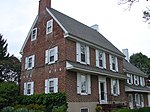Hedge–Carpenter–Thompson Historic District
Geography of Salem County, New JerseyHistoric districts in Salem County, New JerseyHistoric districts on the National Register of Historic Places in New JerseyHouses in Salem County, New JerseyHouses on the National Register of Historic Places in New Jersey ... and 6 more
NRHP infobox with nocatNational Register of Historic Places in Salem County, New JerseyNew Jersey Register of Historic PlacesNew Jersey Registered Historic Place stubsSalem, New JerseyUse mdy dates from August 2023

Hedge–Carpenter–Thompson Historic District is located in Salem, Salem County, New Jersey, United States. The district was added to the National Register of Historic Places on March 26, 2001.
Excerpt from the Wikipedia article Hedge–Carpenter–Thompson Historic District (License: CC BY-SA 3.0, Authors, Images).Hedge–Carpenter–Thompson Historic District
Thompson Street,
Geographical coordinates (GPS) Address Nearby Places Show on map
Geographical coordinates (GPS)
| Latitude | Longitude |
|---|---|
| N 39.570833333333 ° | E -75.475555555556 ° |
Address
Thompson Street 61
08079
New Jersey, United States
Open on Google Maps





